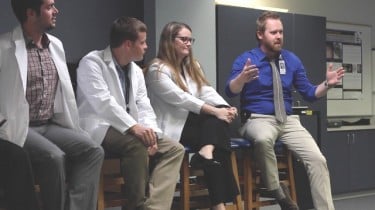By Michael Ferraresi
GCU News Bureau
Students in Grand Canyon University’s pre-health programs on Wednesday visited Midwestern University in Glendale to learn how to set themselves apart from the competition for medical school.
More than 130 students toured Midwestern’s campus near the Loop 101 and 59th Avenue during an event set up through GCU’s pre-health advising office. Panels of Midwestern deans, professors and students provided information in several groups and answered specific questions for those preparing applications for graduate study.
Students also learned more about the Midwestern articulation agreements that were announced earlier this fall. Midwestern has set aside 66 seats in a range of its graduate programs — including osteopathic medicine, optometry, physical therapy, cardiovascular perfusion and others — for GCU students who meet rigorous requirements for acceptance. It’s a way that Midwestern can guarantee interviews for some of GCU’s top students.
The event was organized through Midwestern and GCU pre-health coordinators Helen Howard and Cherissa Chacon, who for the past year have developed new standards to guide undergraduates in the College of Science, Engineering and Technology’s pre-med, pre-physical therapy, pre-pharmacy and pre-physician assistant programs through the highly competitive process of applying to graduate schools. Howard and Chacon help organize mock interviews to prepare students for the real thing at medical school boards, and provide early intervention on grades, medical school test tutoring and other resources to bolster applications.
On Wednesday, GCU students learned from GCU alumni and others in Midwestern’s programs that a mix of qualities leads to acceptance — including demonstrating personal stories and passions for medicine as part of the interview process. But many students had specific questions about requirements based on their ongoing preparation for medical schools, a process that often begins immediately in pre-med tracts.
“It was more about the mechanics of applying, what the programs entail and how to be a competitive applicant,” Howard said.
Midwestern’s staff and faculty, led by Dr. Kathy Player, Midwestern’s chief academic officer and vice president of health sciences, provided breakout sessions on most of the doctoral and master’s level academic programs. Those included osteopathic medicine, podiatry, dental medicine, optometry, veterinary medicine, nurse anesthesia, cardiovascular perfusion, pharmacy, physical therapy, physician assistant, occupational therapy and biomedical sciences.
Midwestern has nearly 3,100 students on its Glendale campus and more than 2,900 on its campus in Downers Grove, Ill., west of Chicago, where GCU students also can apply for reserved seats in some programs.
Player, who is a former GCU president, chief academic officer, provost and dean of the College of Business, helped Howard’s team organize a day specifically for GCU students, giving them a more intimate open-house event. While some students wanted to learn about the doctoral programs that could lead them to futures as surgeons or other medical doctors, others wanted to learn about other niche medical areas.
Player added that Midwestern and GCU have a shared interest in cultivating medical professionals to make an impact in Arizona, rather than losing talented future health care workers to other states.
The cardiovascular perfusion master’s program, Player said, has become wildly popular. Perfusionists are responsible for managing heart-lung machines during procedures such as open-heart surgery. It’s a highly specialized field that involves a two-year grad school commitment, rather than the several years of school and clinical practice required for most medical doctoral degrees.
She told students that Midwestern’s campus culture is much like GCU’s with the private, student-focused emphasis on real-world application of the materials. Midwestern has multiple medical clinics on campus where students may work with patients in the latter stages of their programs. Additionally, Player said, the university ensures that students are “not just a social security number,” by encouraging mentor-apprentice relationships with medical professionals who lead academic programs.
GCU pre-physician assistant senior Scott Johnston said the visit to Midwestern was fruitful. He learned the requirements of the graduate PA program and was able to ask lots of questions. The 31-year-old Army veteran said he took a nontraditional path to his grad-school preparation, so he had questions about addressing some of the program requirements.
He was also impressed by the campus, which is only about 15 miles northwest of GCU.
“I think they have a lot to offer, especially in terms of technology with some of the sim dummies and other things I saw,” Johnston said.
Reach Michael Ferraresi at 602-639-7030 or [email protected].










































































